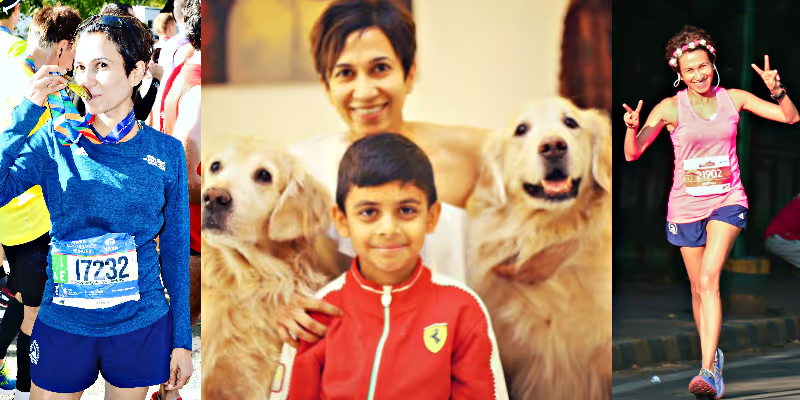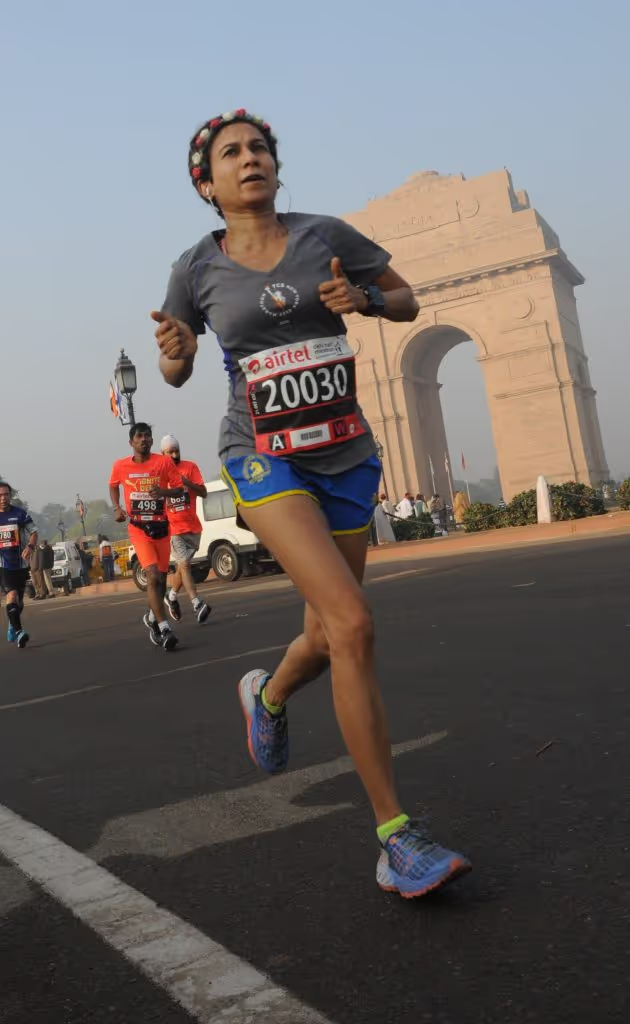Citi, Infy, Goldman Sachs and Deloitte made her boss, but she made herself a leader – meet Vaishali Kasture
Madeleine Albright says that there’s a special place in hell for women who don’t help other women.
So, where would you place someone who works hard to be a worthy role model so that women aspire to a better standard, and then plays the pied piper to take them to the top with her?
You put her on top of one of the world's largest financial services companies, and let her blossom into a one-woman showcase for the mountains women professionals can move.
You put her on top of a mentorship outfit and watch her craft the next lineup of power women.
You put her at the finish line of the world's most coveted marathons, and let her teach you how to lead a wholesome life.
And then, you let 47-year-old Vaishali Kasture, partner at Deloitte, marathoner and mentor, narrate her inspiring story.

Chapter one – Tough decisions
Under the wings of a father who worked closely with the government, Vaishali was always urged to pick up a newspaper, a hobby and, eventually, a promising career. Raised in equal parts in Delhi and Egypt, she graduated from Mumbai’s Sydenham College of Commerce, went to ICWA and, finally,did her MBA from Jamnalal Bajaj, where she finished as a gold medalist.
Chapter two – Getting her hands dirty
After her MBA, Vaishali summer trained with Citi Bank and accepted a pre-placement offer from them - she was the only woman among the ten new joinees. She was part of the custodial services division when the markets were booming, liberalisation was taking root and the stock markets were coursing ahead. Vaishali remembers how days would turn into nights that would again turn into days, while she would still be at her desk.
Nobody noticed that you were a woman – in a good way, because it toughened you up.
She went on to do operations, sales, management, followed by a stint at the Chennai branch for a year-and-a-half before returning to take a role in relationship management. She then moved to Tokyo and Hong Kong when her then husband shifted there. The 18-24 months spent there were a conscious break, a sabbatical. She also had her first child in that duration.
Chapter three – The break
Being the kind of person who likes to plan things, Vaishali likes to know what to achieve out of every day. “I started going to the gym, learnt bridge, took a course in journalism as that was an unfulfilled dream,” she says, adding that taking time off for oneself is as important as putting it to full use in learning something new, and in the process, something new about yourself.
Spending time with the kids is great, but you must take some time out for 'your' life, and 'your' brain. When you come back, you’d have done things that you can talk about and show for. You’d be in a good mental state.
Vaishali's return to work wasn’t as difficult; she had offers pouring in but where she did struggle was finding acceptance upon return. The offer she accepted was from her ex-boss, who invited her to join the brand new Infosys BPO. "The compensation wasn’t great but we had stock options. They wanted to take a chance on the BPO industry which had ramped up since the 80s,” she recalls.
This was the time when data analytics was picking up and making its way to India. Vaishali was their first hire from the banking field and from 2003 to 2007 she was Assistant Vice President in the transition function. Sure, it seems like she hit the ground running, but, zooming into this timeline, she narrates how tricky the first few months were.
Outwardly, an organisation may claim to have a progressive stance, but it is made up of people at the end of the day, and those people may not be completely sensitised. “After a break, people tend to doubt your capability to work hard – and I had a lot of skeptics at Infy. Women struggle and the system won’t make it any easier for them to transition back. Here's the key. Do not give them reason to doubt you. We, as women, don’t plan our comeback meticulously, and do not create a support system, but we must,” she says.
Chapter three – Eye openers
Vaishali then headed the global capital markets and banking division at Infosys' BPO – she was one of the first few to be promoted from VP. “I was again, one of the very few women who would pick up something like migration and transition because it involved late nights, travelling at the drop of a hat, but I took it because it never struck me that I’m a woman and women don’t do this. It was only when my boss quizzed me that women don’t typically sign up for these roles that I realised I was an anomaly,” she recalls.
When Infosys bought out its BPO Vaishali realised she didn’t want to be running just another vertical in the company. So, along with a lot of the senior management she migrated to another company that was looking for an India head – Fulcrum, where she was the first employee. “This was a whole new ballgame. It was like creating my own brand, with legal and corporate approvals, hiring the first employees and setting up an office,” she recalls. She did that for four years, and scaled to a thousand people in the first three. Another private equity firm bought out this company, later.
Chapter four – The peak
It was then that Vaishali's most prominent stint came. She received an offer to join Goldman Sachs as their MD in India. “This was the first time they had hired a local MD. I was also the first and senior-most woman they had hired in India,” she says.
But it was a very internal looking role – looking into daily operations with no sales and PNL responsibilities. “I was beginning to itch a little bit, because all my previous jobs had a customer angle. I left Goldman on a great note, and joined Deloitte as a partner in their consulting services,” she says, of a transition that was reported widely.
At Deloitte, Vaishali currently manages banking clients and global banks that have a presence in India. “I also helped them set up their robotic process automation arm. You get outdated in the market if you don’t update your skillset,” she adds.
Chapter five – A life in review
Spending nearly 22 years as a leader, Vaishali has now learnt what it takes to make the climb, and wants to leave no woman behind. As she matured as a leader over the past decade, she set out to set an example.
Sheryl Sandberg and Indra Nooyi are great but too far away for one to be able to relate to them - it is important for women to see physical role models, to aspire to be them. That’s why I was vocal and accessible
There are women from older generations who opine that one has to struggle and fall, and that’s just how it is. But Vaishali is not of that school of thought. “If I can accelerate a woman’s growth, if I have made my mistakes and got my lessons already, I wouldn’t want other women to make the same errors,” she says.
She is, evidently, a fan of the ‘Women helping Women’ movement, because women, she has witnessed, definitely encounter more barriers to their success than men. “Men, for instance, have a natural tendency to lobby and network, but it takes exceptional courage for women to reach out to me and ask for help. So, if I had limited time, I am biased in favour of women – the situation is still bad enough for this to be a necessity,” she notes.
Chapter six - Walking the talk
A year-and-a-half ago, she noticed that this phenomenon encompasses not only women in corporates, but women entrepreneurs as well. “Women don’t have access to the right circuits, networks etc. The numbers are dismal for funding pumped into women-run ventures. I had to move the needle, even if it was on a small scale,” she says.

Vaishali established Sonder Connect, a cohort-based, not-for-profit mentorship programme over and above her day job, with three other friends – Sejal Shah Gulati, Latika Pai and Anju Shenoy. “For six months, we not only mentor them on everything from marketing to digital to fundraising, but also provide them access to networks, through expert voices and veteran players, like IBM, which also provided some funding,” she explains. They are now launching their second batch of 15 women entrepreneurs this month, selected from 100 odd applications. Last year, they even sent two women to the Blackbox in Silicon Valley.
Chapter seven: Just keep running
Around the time she was 30, Vaishali started running and hasn't stopped since. Today, she plans every holiday around a race, and has run five of the six major ones in four continents. “Running is food for my soul. Very few people in the world have run all six, and I plan to check that off my list by 2020,” she informs us.
Along with some friends, Vaishali set up India Amateur Runners Trust, to help underprivileged runners by raising money for their outfitting and training.
All in all, she believes that a woman's life is beautifully pluralistic, and that every woman must be stimulated enough to explore herself - and her family, company and companions would also benefit from her many colours. "It's great economics!" she insistently quips, in conclusion.







